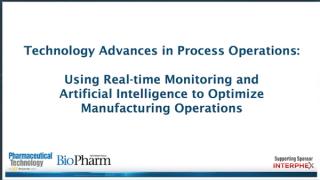
Process Control, Automation, and PAT
Latest News
Latest Videos

More News

This collaboration will combine BigHat Biosciences’ AI/ML-guided Milliner platform with AbbVie's expertise in oncology and neuroscience to develop next-generation antibodies.

MilliporeSigma’s new platform combines generative AI, machine learning, and computer-aided drug-design aimed at increasing the success rate of new drugs and therapies.

Digital transformation allows for smarter and connected biomanufacturing operations.

Under this multi-year collaboration, Genentech and NVIDIA will use AI to optimize and accelerate each company’s platforms to discover and develop innovative therapeutics.

Hollie Barton, senior director, Chromatographic Services, for the PPD clinical research business of Thermo Fisher Scientific, reviews the company’s latest moves in targeting automation.

The implementation of Industry 4.0 is projected to save time and cost for designing an optimal manufacturing process.

SCHOTT now offers ViewCell, a new component meant to add flexibility to biopharmaceutical process control.

Laks Pernenkil, principal and practice leader, US Life Sciences Product & Supply Operations, Deloitte, discusses the impact that digitalization is having on data generation and data integrity in bio/pharma manufacturing.

EMS is a leader in the cleanroom industry, delivering complete cleanroom monitoring and control solutions, services to customers, and ensuring quality by design from inception to process control.

A survey was conducted to examine the adoption of machine learning and artificial intelligence in the bio/pharma manufacturing industry.

Bristol Myers Squibb has joined Cellares’ Technology Adoption Partnership program just as Cellares launches operations as an integrated development and manufacturing organization.

Rentschler Biopharma, CGT Catapult, and Refeyn aim to use automated and digital technologies to improve AAV manufacturing for gene therapies.

There are solutions on the horizon that will help overcome the current bottlenecks and other challenges that are occurring in early drug development.

Manufacturers face the challenge of meeting growing demand for personalized biopharmaceuticals.

Monil Malhotra, vice-president of Industrial Software at Emerson, discusses the growing demand for software solutions in the pharma industry.

Claudio Fayad, VP of Technology, Process Systems, and Solutions discusses the intersection of automation and data security in the pharma industry.

Nathan Pettus, president of Process Systems and Solutions at Emerson, discusses how automation is impacting recent sustainability technologies and solutions.

Organizations can better understand the maturity of AI-driven automation technology across their organization’s IT landscape through effective pharmacovigilance.

Shifts in pharmaceutical packaging have spurred tremendous growth in the pre-filled syringe fill/finish industry.

Through the integration of human expertise, artificial intelligence, and automation robotics, bio/pharma companies can more efficiently target drug discovery efforts with bigger payoff.

Through collaboration and transparency, engineering and automation companies can achieve great efficiencies and success for their customer by integrating intelligent design into a facility.

By taking a digital maturity-first approach to Pharma 4.0, manufacturers can optimally position themselves for success.

Leveraging smart technology and SMEs for significant operational and financial benefits.

Automation enables intensification of downstream processes.

Automation and digitalization work together in the digital plant.



